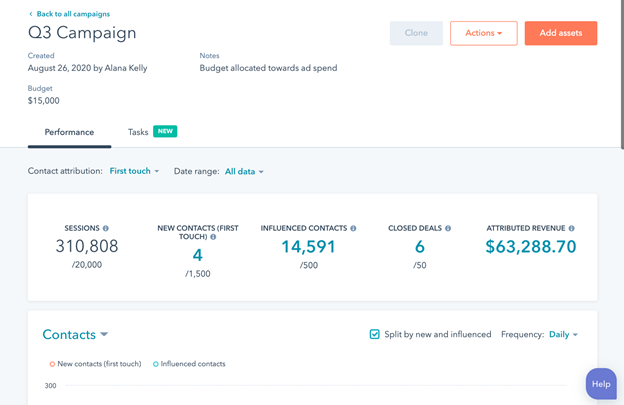When it’s time for a product launch or other major business change, there’s a lot of work to do on the marketing side of your organization.
You’ll need a targeted marketing campaign that gets your business in front of your ideal audience while making the best use of your team and marketing resources.
To do this, effective marketing campaign management is a must. In this coordinated approach, a campaign manager leads a team in the planning, execution, and assessment of your campaign.
Because campaign management can be complex and often contains many moving parts, we’ve created this guide to help you make the most of your campaigns.
In this article, we’ll cover what campaign management is, what campaign managers do, and best practices for managing a successful marketing campaign.
What is campaign management?
Campaign management encompasses the planning, executing, and tracking of a marketing initiative. Campaign managers coordinate all the necessary elements and team members to achieve agreed-upon goals.
Most businesses, however, aren’t accessing all the benefits campaign management can offer. Just 43% of organizations mostly or always complete projects on budget, and only 29% of organizations complete them on time.
You see, excellent marketing results don’t happen by accident. The best marketing campaigns result from purposeful planning and excellent campaign management. That helps you and your team achieve better results.
3 marketing campaign management examples
Typically, you’ll design a marketing campaign with a specific goal in mind, like promoting a new product. It’s distinct from everyday marketing efforts.
Here are some examples of what campaign management entails for a few different types of campaigns.
Product launch campaign: Your team might plan a product announcement, promote an email list for early access to the product, offer discount pricing for early buyers, and increase the product’s social media following using engaging product-led content. As a campaign manager, you’ll help plan the timing for each phase and introduce new strategies if early efforts don’t pay off.
Social media growth campaign: Increase social media followers by guiding your team to create new social media content, optimize your profiles, and host giveaways or influencers. You’ll need to establish impression and engagement goals and metrics to measure your success.
Customer loyalty campaign: Boost customer retention by offering discounts and exclusive products and/or developing a rewards or referral program. To design the best campaign, lead your team in asking for customer feedback and brainstorming how to best meet customer needs.
How to manage a marketing campaign
If campaign management seems complex and overwhelming, don’t worry — in this section, we’ll take you through managing a new marketing campaign step-by-step.

Establish your campaign goals
The very first thing you’ll need to do when managing a marketing campaign is decide on your campaign goals.
Early on, your campaign goals might be more broad, such as boost brand awareness or generate more preorders.
As you work with your team to develop the campaign strategy, you’ll refine these goals to include the specific performance indicators you’ll measure to determine campaign success.
Right now, though, you just need to understand the purpose of your campaign and how it fits into larger business initiatives.
Identify your key team members
As the marketing campaign manager, you likely have a broad sketch of what your marketing campaign will look like. With your vision in mind, think about who you need on your campaign team.
For instance, your social media marketing specialist is an absolute must if you're using social media. If it’s a product launch, recruit someone from product development to advise.
As you build your campaign team, consider both hard and soft skills.
You’ll need people who know the ins and outs of campaign management software, analytics platforms, and digital marketing channels, but you’ll also need good communicators and enthusiastic collaborators. Make sure you balance these team roles.
56% of managers say work is trending toward small informal teams, so don’t be afraid to lean into that.
Take advantage of casual collaboration and working closely with a small group, rather than weighing down your team with people who might be more productive elsewhere.
Develop a holistic campaign plan
Next, host a meeting or series of meetings with your team to sketch out the major components of your campaign. Think through some of the following aspects of a well-developed marketing plan:
- What marketing channels will you use?
- What campaign content do you need to create?
- What resources do you need to gather?
- How long will it take to create the campaign materials?
- What is the campaign timeline?
Your campaign plan should have a clear line from the business need that sparked the marketing campaign to how you will achieve the desired results. It should also include agreed-upon performance indicators that you’ll use to track progress toward those results.
Assign roles and deadlines
Next, break down your campaign strategy into small, specific tasks with deadlines.
For instance, you might have a planning phase where you create campaign content such as email copy, social media graphics or Amazon ads if it’s an ecommerce business. Each piece of content should be its own task with its own deadline.
Then, assign each task to the appropriate team member. If you’re using a task management tool or campaign management software, you’ll be able to do this pretty easily.
In many tools like this, you can use marketing automation to build in processes for reviewing and approving campaign tasks. You can even set reminders to make sure your team is hitting those deadlines.
Create a dashboard to track progress
Marketing campaigns move fast, especially if you’re running them online. To keep your finger on the pulse of your campaign, build an analytics dashboard that tells you everything you need to know at a glance.
Some campaign management software allows you to connect your data sources so you can see everything in a single view.
This automatic data compilation saves you a ton of time, considering that 54% of project managers don’t have access to real-time KPIs, and a third spend a day or more manually compiling data.
With a campaign dashboard, you’ll identify campaign problems early, allowing you to pivot to best reach your customers and maintain campaign success.
Hold regular check-ins with your team
Along with your daily dashboard check, be sure to meet with your team regularly to keep everyone on track and on deadline.
You’ll also need to make sure everyone has the tools, information, and other resources they need to complete their work.
As the campaign progresses, it’s also smart to ask for your team’s insights and feedback so you can make changes to campaign execution or your internal processes as needed.
Pivot your campaign strategy when needed
As the campaign manager, you’ll have to decide when your strategy should change so you can meet your marketing campaign goals and deadlines.
Your campaign management software, daily campaign goals dashboard, and regular team check-ins all contribute to the data and information you’ll need to make these decisions.
If you do decide to switch, make sure you clearly communicate the changes with your entire team, as well as any higher-ups or C-level executives who need to be in the loop. Reassign roles, set new deadlines, and highlight any new benchmarks or goals you’ve set.
Pivoting your strategy is vital to making sure you offer the best experience to your customers at all times. When you see something isn’t getting the results you want, optimizing is the right call for both your customer experience and your bottom line.
Debrief with your team
Campaign management doesn’t end as soon as you hit your campaign goals.
After your marketing campaign concludes, you’ll need to assess the campaign performance and debrief with your team to figure out what went well and what to improve upon for the next campaign.
Your debrief can be fairly casual, such as asking each team member for their feedback. Or, you can take a more formal approach, such as a SWOT analysis.
4 campaign manager best practices
As you can see from our how-to guide, campaign managers hold a complex and important role. They’re ultimately responsible for the success or failure of their campaigns.

As a campaign manager, you’ll need to be an excellent leader, proficient business communicator, and marketer. Here are a few things you should be sure to do as you manage your campaign.
Kick-off campaign planning
Every good marketing campaign starts with a holistic planning meeting to set common goals and align everyone’s responsibilities and expectations. As a campaign manager, you’ll need to plan and lead the meeting.
To do so, create an agenda and send it out to your team before the meeting.
If you want them to come prepared with ideas for certain elements of your campaign, or if you need specific data, be sure to request that ahead of time.
Track campaign progress daily
Once your campaign is underway, you’ll need to keep a birds-eye view of your campaign performance.
By building a dashboard with your critical performance indicators, you can identify issues early and guide your team to a speedy resolution.
Use project or task management tools
Marketing campaigns have a lot of moving parts, so effective campaign managers use a project or task management tool to stay organized.
With a tool like this, you can typically:
- Assign team members tasks and deadlines
- Use marketing automation to save time, such as setting recurring tasks, email finding, or moving items to review
- Generate a campaign dashboard to track progress
You may also consider using marketing campaign software, which may give you more access to data sources and other marketing-specific tools.
Empower team members to lead
While a marketing manager may lead many campaigns, it’s also smart to hand over campaign management to channel experts when they have the necessary skills and experience.
You may even be able to train your team members to serve as campaign managers as you scale your marketing efforts — a great move for future-proofing your company.
Up to 78% of managers think more people will need project management skills in the future, and 65% of organizations are prioritizing recruiting employees with leadership skills.
If you can identify and develop those skills on your team, you’ll build a strong foundation for campaign management in the future.
5 essential campaign management tool features
The right campaign management tools are essential to getting the best results and working well with your team.
Plus, they’re becoming more important than ever, with 53% of organizations looking to build a company culture that increasingly invests in technology. Even more organizations — 75% of them — expect the use of team collaboration tools to increase in the future.
When choosing a marketing campaign management software, you’ll find some all-encompassing options like Hubspot or Marketo.

These platforms bring all the elements of your campaign together under a single interface. You could also use a combination of tools to help you plan your ideal campaign.
No matter which approach you take, look for these features in your campaign management tool:
- Task and project management tools like RoundPie for assigning roles and tracking deadlines
- Marketing automation for reducing tedious manual work and running automated campaigns
- Integrations with other marketing tools such as email marketing software, landing page builders, or CRMs like Salesforce
- Analytics and reporting to build dashboards that monitor campaign performance
- Flexibility and scalability so you can run larger or multiple campaigns.
With an effective campaign management system, your marketing team will be ready to make the most of every marketing effort.
Boost your campaign management practices now
Successful campaign management relies on working closely with your team and using the right tools to track your success and progress.
With our tips, how-tos, and best practices, you’ll be poised to run a successful marketing campaign that gets the best results for both your customers and your business.
About the author:
Joanne Camarce is a digital marketer focused on growing and strategizing B2B marketing and PR efforts at uSERP. She loves slaying outreach campaigns and connecting with brands like G2, Wordstream, Process Street, and more. When she's not wearing her marketing hat, you'll find Joanne lost in the world of Japanese music and art, or just being a dog mom.
What would you like to know and what would be the best way to share this information to you? What is the best tips & tricks, what workaround do you use? We'd really appreciate your insight on these ones to make our integrations better, more productive and much more efficient. Comments, tweets are always welcome.